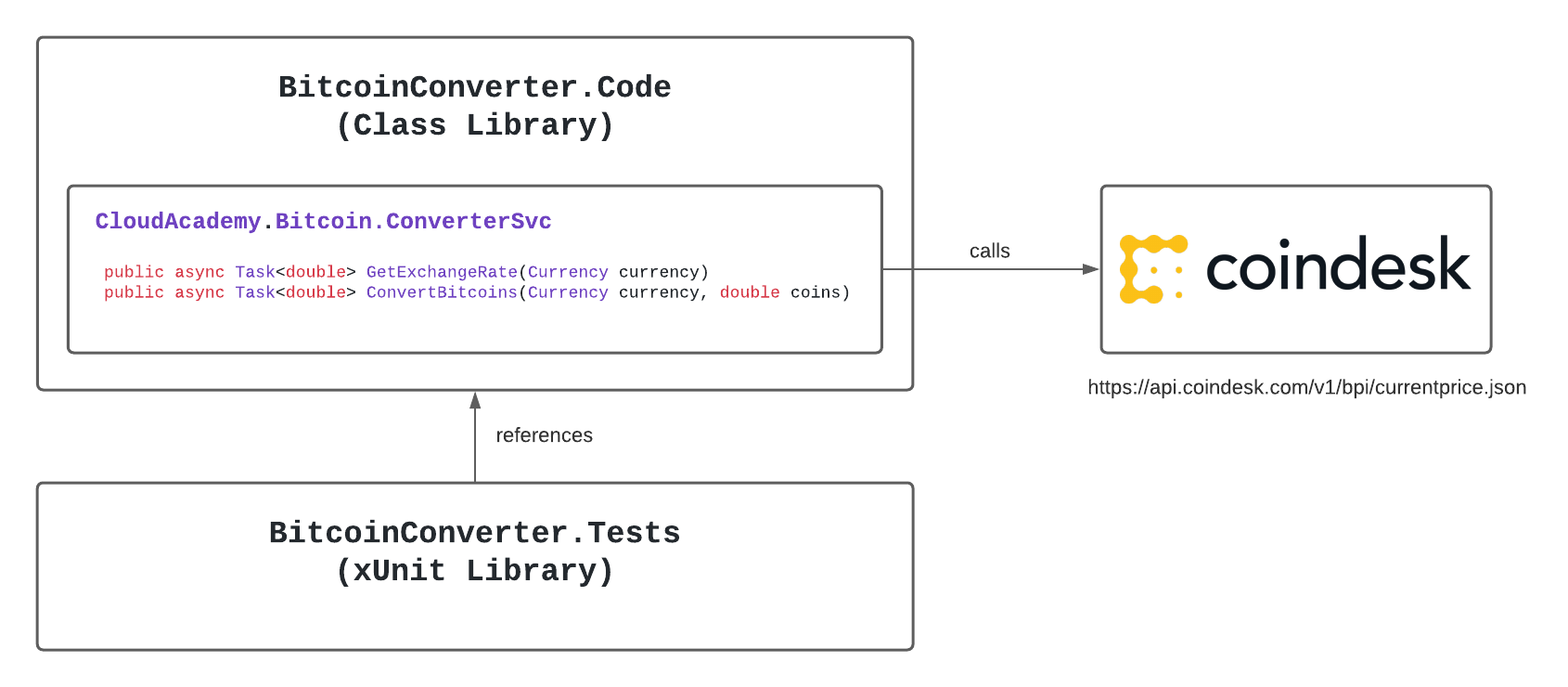The following repo contains source code developed using TDD (Test Driven Development) practices. The sample project implements a .Net Core 3.1 C# library which interacts with the Bitcoin Price Index api.
Note: If you intend to follow along and complete the full demonstration then please fork or setup a new GitHub repo - as step 9 will require you to create a GitHub Secret to store the Coveralls project token. Coveralls is used to create code coverage reports and visuals.
🤘
.Net Core 3.1 is required for this project.
The provided C# code and instructions have been tested with the following version:
dotnet --version
3.1.403
The following tools and frameworks have been used to perform the TDD developement:
- xUnit - a unit testing framework, used to implement unit tests
- Moq - a mocking library, used to create mocks for external dependencies
- GitHub Actions - used to provide CICD features for automated building and testing
- Coveralls - used to provide unit test code coverage reports
Branches are used within this repo to demonstrate the TDD workflow (red, green, refactor), as well as highlighting other project management configuration areas. These branches allow you to quickly jump ahead to the area of interest:
-
step1 - demonstrates using the
dotnetcommand to setup the project structure and create the first set of unit tests using xUnit and the[Fact]attribute -
step2 - refactors current unit tests and codebase using the
[Theory]attribute - also demonstrates the use of thedotnet watchcommand to automatically execute all unit tests whenever the source code is changed -
step3 - refactors the unit tests and codebase to use the async/await keywords to manage asynchronous HTTP comms with the Bitcoin API online service
-
step4 - introduces the Moq library to mock out the external Bitcoin API service dependency
-
step5 - refactors the unit tests and codebase to add addtional unit tests to test error conditions
-
step6 - adds in a GitHub Action workflow to perform automatic build and tests on push events - produces a DLL artifact
-
step7 - updates the GitHub Action workflow to automatically produce a release for the built DLL artifact on tag events only
-
step8 - creates a client console project to test the GitHub Action built DLL artifact - additonally adds badges to the README.md to render the current build status
-
step9 - updates the existing GitHub Action to generate a unit test code coverage report and have it automatically uploaded into https://coveralls.io/ for viewing
Note: The main branch (this branch) contains the same code and configuration as contained in the step9 branch
This project builds a .Net Core 3.1 library which contains the following 2 public methods:
public async Task<double> GetExchangeRate(Currency currency)returns in realtime the current Bitcoin exchange rate for the given currency (USD, GBP, or EUR)
public async Task<double> ConvertBitcoins(Currency currency, double coins)returns the dollar value for the given currency (USD, GBP, or EUR), and the number of Bitcoins
To build the Bitcoin Converter Library perform the following commands:
dotnet build
This project also contains a sample client console based application - which imports the Bitcoin Converter library. To build and run the client for Linux x64 distros, perform the following commands:
#build/package executable file
cd BitcoinConverter.Client
dotnet publish --runtime linux-x64 --configuration Release /p:TargetFramework=netcoreapp3.1 /p:PublishSingleFile=true /p:PublishTrimmed=true
#run executable:
./BitcoinConverter.ClientThis project demonstrates how to use GitHub Actions to perform automated builds, testing, packaging, and releases.
name: bitcoinconverter.build
on: push
jobs:
build:
runs-on: ubuntu-latest
steps:
- uses: actions/checkout@v2
- name: Setup .NET Core
uses: actions/setup-dotnet@v1
with:
dotnet-version: 3.1.402
- name: Install Dependencies
run: dotnet restore
- name: Build
run: dotnet build --configuration Release --no-restore
- name: Test
run: dotnet test --no-restore --verbosity normal
- name: Generate Test Coverage Report
run: |
ls -la
mkdir -p BitcoinConverter.Tests/TestResults
cd BitcoinConverter.Tests
dotnet test /p:CollectCoverage=true /p:CoverletOutput=TestResults/ /p:CoverletOutputFormat=lcov
- name: Publish Test Coverage Report
uses: coverallsapp/github-action@v1.1.2
with:
github-token: ${{ secrets.GITHUB_TOKEN }}
path-to-lcov: BitcoinConverter.Tests/TestResults/coverage.info
- name: Upload Artifact
uses: actions/upload-artifact@v1.0.0
with:
name: BitcoinConverter.Code.dll
path: BitcoinConverter.Code/bin/Release/netcoreapp3.1/BitcoinConverter.Code.dll
- name: Make Release
uses: softprops/action-gh-release@v0.1.5
if: startsWith(github.ref, 'refs/tags/')
with:
files:
BitcoinConverter.Code/bin/Release/netcoreapp3.1/BitcoinConverter.Code.dll
env:
GITHUB_TOKEN: ${{ secrets.GITHUB_TOKEN }}
This project forwards its unit testing code coverage reports to coveralls.io for report viewing and analysis
The provided Vagrantfile can be used to spin up an Ubuntu 18.04 instance - which can then be used to install the .Net Core 3.1 SDK, allowing you to easily follow along:
Vagrant.configure("2") do |config|
config.vm.box = "ubuntu/bionic64"
config.vm.provision "shell", inline: <<-SHELL
apt-get update
SHELL
end
Use the following Vagrant command to launch the instance:
vagrant up
Then SSH into the instance by running the following command:
vagrant ssh
The .Net Core 3.1 SDK can then be installed using the following instructions:
wget https://packages.microsoft.com/config/ubuntu/18.04/packages-microsoft-prod.deb -O packages-microsoft-prod.deb
sudo dpkg -i packages-microsoft-prod.deb
sudo apt-get update
sudo apt-get install -y apt-transport-https
sudo apt-get update
sudo apt-get install -y dotnet-sdk-3.1
To confirm that the .Net Core 3.1 SDK has been successfully installed, run the following command:
dotnet --version
Back on your local workstation, you can use Visual Studio Code or any other editor to open and modify the contents of the current folder - with all changes being automatically synced back into the /vagrant directory within the Vagrant instance.
